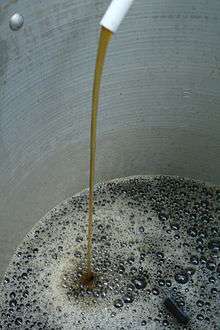Definify.com
Webster 1913 Edition
Wort
Wort
,Wort
,Webster 1828 Edition
Wort
WORT
,Definition 2026
Wort
Wort
German
Noun
Wort n (genitive Worts or Wortes, plural Wörter or Worte, diminutive Wörtlein n or Wörtchen n)
- (plural Wörter) word as an isolated unit
- Im Deutschen gibt es wenig Wörter, die mit y geschrieben werden.
- In German there are few words spelt with y.
- Im Deutschen gibt es wenig Wörter, die mit y geschrieben werden.
- (plural Worte) utterance, word with context
- Er erklärte das Problem mit wenigen Worten.
- He explained the problem in few words.
- Keiner wagte dem Wort des Königs zu widersprechen.
- No one dared contradict the king's word.
- Er erklärte das Problem mit wenigen Worten.
- (uncountable) speech, speaking, (figuratively) floor
- Er beherrscht unsere Sprache in Wort und Schrift.
- He masters our language in speech and writing.
- Der Präsident erteilte dem Abgeordneten das Wort.
- The president gave the delegate the floor.
- Er beherrscht unsere Sprache in Wort und Schrift.
- (uncountable) promise, (figuratively) word
- Ich gebe dir mein Wort, dass ich pünktlich da bin.
- I give you my word that I shall be there on time.
- Ich gebe dir mein Wort, dass ich pünktlich da bin.
Usage notes
A clear distinction is made in the standard language between the plural forms Wörter and Worte (as above). In colloquial German, this is not always the case. Worte is not unfrequently heard for sense 1, and Wörter is occasionally heard for sense 2.
Declension
Derived terms
|
|
|
- (grammar, parts of speech):
- (adjective): Artwort, Beinennwort, Beiwort, Eigenschaftswort, Wiewort, (rare) Beschreibungswort, (rare, dated) Eigenheitswort
- (adverb): Nebenwort, Umstandswort, Zuwort
- (article): Geschlechtswort
- (conjunction): Bindewort, Fügewort
- (interjection): Ausdruckswort, Ausrufewort, Empfindungswort, Zwischenwort
- (noun (sensu lato)): Namenwort, Nennwort
- (noun (sensu stricto), substantive): Dingwort, Gegenstandswort (ambiguous), Hauptnennwort, Hauptwort, Sachwort
- (numeral, number): Zahlnennwort, Zahlwort
- (participle): Mittelwort
- (preposition): Verhältniswort, Vorsetzwort, Vorwort
- (pronoun): Fürwort, Fürnennwort, Personenwort, Personwort, Vertretewort, Vertretungswort
- (verb): Aussagewort, Tätigkeitswort, Tuwort, Wandelwort, Zeitwort
- (grammar) Hilfswort, Lagewort, Verrichtungswort
- (grammar) Pluralwort, Singularwort
- (linguistics) Kurzwort; Endwort, Klammerwort, Kopfwort, Rumpfwort, Schwanzwort, Silbenkurzwort
wort
wort
English
Noun
wort (plural worts)
- (archaic) A plant; herb; vegetable.
- 1621, Robert Burton, The Anatomy of Melancholy:
- he drinks water, and lives on wort leaves, pulse, like a hogg, or scraps like a dog […].
- 1845, Rev. Jeremy Taylor, Works:
- It is an excellent pleasure to be able to take pleasure in worts and water, in bread and onions, for then a man can never want pleasure when it is so ready for him, that nature hath spread it over all its provisions.
- 1621, Robert Burton, The Anatomy of Melancholy:
- Any of various plants or herbs. The word is usually used in combination to refer to specific plants, e.g. St. John’s wort; however, it may be used on its own as a generic term.
Derived terms
Translations
See also
-
 List of wort plants on Wikipedia.Wikipedia
List of wort plants on Wikipedia.Wikipedia
Etymology 2

From Middle English wort, worte, from Old English wyrt, wyrte (“brewing wort, new beer, spice”), from Proto-Germanic *wurtijō (“spice”), from Proto-Indo-European *werǝd-, *wrād- (“sprout, root”). Cognate with Dutch wort (“wort”), German Würze (“wort, seasoning, spice”), Danish urt (“beer wort”), Swedish vört (“beer wort”).
Noun
wort (uncountable)
- (brewing) Liquid extract from the ground malt and grain soaked in hot water, the mash, as one of the steps in making beer.
Translations
See also
Anagrams
Old Dutch
Etymology
From Proto-Germanic *wurdą, from Proto-Indo-European *werdʰo-. Compare Old High German wort, Old Saxon, Old Frisian, and Old English word, Old Norse orð.
Noun
wort n
Declension
Descendants
- Dutch: woord
Old High German
Etymology
From Proto-Germanic *wurdą, whence also Old Dutch wort, Old English and Old Saxon word, Old Norse orð, Gothic 𐍅𐌰𐌿𐍂𐌳 (waurd). Ultimately from Proto-Indo-European *werdʰo-.
Pronunciation
- IPA(key): /ˈwort/
Noun
wort n